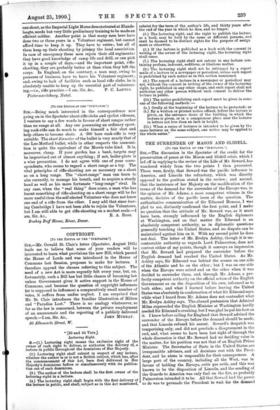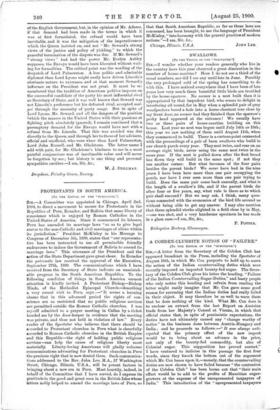THE SURRENDER OF MASON AND SLIDELL.
[To THE EDITOR OF THY "SPECTATOR.")
Sin,—The discussion in the Spectator of the credit for the preservation of peace at the Mason and Slidell crisis, which I led off in replying to the review of the Life of Mr. Seward, has wandered widely from the two points I then presented. These were, firstly, that Seward was the pacific influence in America, and Lincoln the refractory, which was directly opposed to the position stated in the review; and second, that the insistence of her Majesty on the modification of the terms of the demand for the surrender of the Envoys was, in the opinion of Mr. Adams, a most competent witness in the matter, decisive of the pacific issue of the question. The authoritative communication of Sir Edmund Monson, I was glad to see, distinctly confirmed the first point, and I make no question that the attitude of Mr. Seward was, as it must have been, strongly influenced by the English diplomats at Washington, and on that matter Sir Edmund is an absolutely competent authority, as in diplomatic questions generally touching the United States, and no dispute can be maintained against him on it. With my second point he does not deal. The letter of Mr. Evelyn Ashley, though it is un- contestable authority as regards Lord Palmerston, does not contest either of my points, though it conveys an impression that Mr. Seward had prepared the surrender before the English demand had reached the United States. As Mr. Ashley says, Sir Edmund was behind the scenes on one side of the Atlantic and he on the other ; but I was on one side when the Envoys were seized and on the other when it was decided to surrender them, and, through Mr. Adams, a per- fectly competent authority on the official action of the English Government as on the disposition of his own, informed as to both sides; and what I learned before leaving the United States was absolutely in confirmation of what Sir Edmund says. while what I heard from Mr. Adams does not contradict what Mr. Evelyn Ashley says. The absurd pretension that Admiral Milne superseded the English Minister at Washington hardly needed Sir Edmund's crushing, but I was glad he put his foot on it. I knew before sailing for England that Seward advised the surrender of the Envoys before the demand should be made, and that Lincoln refused his assent. Seward's despatch was temporising only, and did not preclude a disagreement in the end, and, what seems to have been lost sight of through the whole discussion is that Mr. Seward had no deciding voice in the matter, for his position was not that of an English Prime Minister. The Secretaries of State in the United States are irresponsible advisers, and all decisions rest with the Presi- dent, and he alone is responsible for their consequences. A large part of the country, including all the West, was in favour of holding the Envoys, colds que coide, and this was known to be the disposition of Lincoln, and the sending of the Guards to America was only fuel on the fire, as probably Palmerston intended it to be. All that Seward had the power to do was to manacle the President to wait for the demand of the English Government, but, in the opinion of Mr. Adams, if that demand had been made in the terms in which it was at first formulated, the refusal would have been inevitable, and it was the mitigation of the imperativeness which the Queen insisted on, and not " Mr. Seward's strong views of the justice and policy of yielding," to which the peaceful termination of the dispute was' due. If Mr. Seward's " strong views " had had the power Mr. Evelyn Ashley supposes, the Envoys would have been liberated without wait- ing for formalities. The critical point was the wording of the despatch of Lord Palmerston. A less politic and admirable diplomat than Lord Lyons might easily have driven Lincoln's obstinate nature to extremes, and at that moment Seward's influence on the President was not great. It must be re- membered that the tradition of American politics imposes on the successful candidate of the party his most influential rival as Secretary of State, and it was well known that Seward was not Lincoln's preference but his defeated rival, accepted mat- gre through the necessity of party usage. But in spite of Lord Lyons, Mr. Seward, and all the dangers of the position (which the masses in the United States with their passions at fighting pitch absolutely ignored), I remain convinced that a peremptory demand for the Envoys would have met with a refusal from Mr. Lincoln. That this was avoided was due directly to the Queen, and through her to these of her advisers, official and unofficial, who were wiser than Lord Palmerston, Lord John Russell, and Mr. Gladstone. The latter name I add with pain, for Mr. Gladstone's kindness to me in a most painful conjuncture was of inestimable value and will never be forgotten by me ; but history is one thing and personal sympathies another.—I am, Sir, &c., W. J. STILLMAN.
Deepdene, Primley Green, Surrey.



































 Previous page
Previous page